19 Apr 2018 | Awards
[vc_row][vc_column][vc_video link=”https://youtu.be/o-Bb-sJQ0Qg”][vc_column_text]In the last four years as head of Index I have used various ways to describe this organisation, but a friend hit it on the head earlier this week when she emailed about a vigil she was organising in London. “Index,” she said “please don’t forget to bring your megaphone.”
And that’s us. That’s what we do. Index brings the megaphone. Both literally and metaphorically.
We amplify the voices of those facing censorship – by publishing their work, by campaigning on their behalf, and by supporting them through initiative like the awards fellowship. And we amplify the cause of freedom of expression by promoting debate about it.
Why do we do it?
We do it because we believe freedom of expression is not just a fundamental freedom, but the fundamental freedom. The one on which all others are based. Without freedom of expression how do we begin to articulate our desire for all other freedoms – the freedom to love whomever we choose, to express our faith – or lack of it – or our political beliefs. Freedom of expression allows us to test our ideas, posit our opinions – and to have those ideas and opinions tested. Freedom of expression is not a freedom that benefits only the powerful and privileged. It is what allows us to hold them to account. Free speech has been at the heart of resistance and reform movements since time immemorial. From women’s suffrage to gay rights. As civil rights activist and US congressman John Lewis observed: “Without freedom of speech and the right to dissent, the Civil Rights movement would have been a bird without wings.”
Freedom of expression gives hope, thought and desire flight — and it is a right that continues to benefit modern movements for change.
It is also freedom that is hard won but easily lost.
Index has fought for this freedom for the past 46 years. We make good on our belief that everyone should be able to express themselves free from fear of harm or persecution by publishing work by censored writers and artists, by monitoring threats to media freedom, and through our awards fellowship.
Our goal in all of this is the same: to amplify the voices of those fighting to be heard – no matter what their views.
We are proud to know and to celebrate not just tonight’s winners, but also all of this year’s nominees – and we are glad that some, like Silvanos, are able to be with us this evening. We are proud to be joined by former winners Zaina Erhaim, Safa Al Ahmad and to be celebrating tonight’s winners with other courageous defenders of free speech: Sayed Alwadaei, Matthew and Paul Caruana Galizia – who are ensuring not only that the killers of their mother Daphne are brought to justice but that her stories and those of individuals like her see the light of day.
And as we remember Daphne we also think of those winners who cannot be with us this evening such as Nabeel Rajab and Bassel Khartabil.
Freedom of expression needs such passionate defenders. We need such passionate defenders of freedom of expression.
But freedom of expression is not simply about defending a principle. Freedom of expression needs defenders, yes, but it also needs friends. As we heard from Zaheena Rasheed, sometimes all you need to carry on is the knowledge that you are not alone.
Your presence here this evening reminds all those who fight to make their voices heard, and who champion the rights of everyone to speak freely, that they are not alone.
But, as those of you who have attended an awards event before know, freedom of expression is not free. Even megaphones cost money. Index achieves an enormous amount with a staff of just 12 people, whom I salute and applaud this evening, and with the help of supporters like the Edwardian Hotels Group who have generously provided tonight’s venue, drinks and canapes – as well as the accommodation for our winners. Despite this, we cannot help all those we want to. We want to do more. And we’d like you to help us to do that.
So, this is the part of the evening where you get to express yourselves. I’d like to ask each and every one of you who does not already support Index – and those who do – to take that pen and to express yourself by making a donation to Index. Now.
Let’s speak loudly together and lift up the voices not just of Yanelys and Luis, Wendy, Guy and Ahmad but all those fighting to speak freely.
Thank you.[/vc_column_text][/vc_column][/vc_row]
10 Apr 2018 | Bahrain, Bahrain News, Uncategorized
[vc_row][vc_column][vc_column_text]
In 2011 Bahraini human rights defenders were arrested for pro-democratic activism. Seven years on, monthly protests are reminders of ongoing injustice.
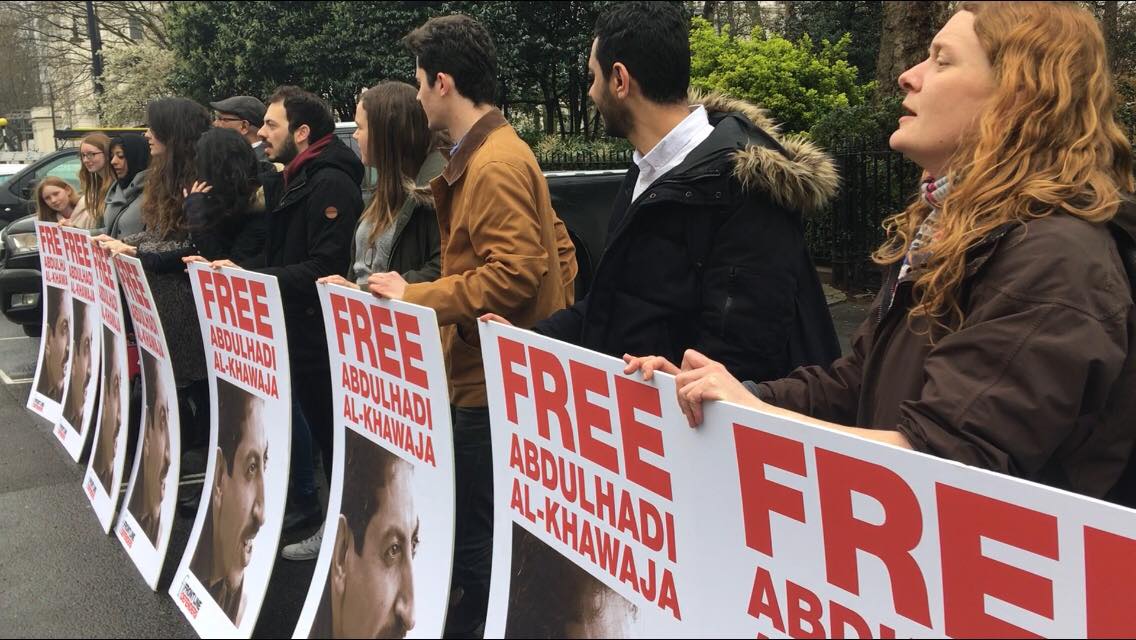
Protesters gathered outside the Bahrain Embassy shouting “free free Abdulhadi” as activists continue to be targeted
NGO’s gathered yesterday at the Bahrain embassy in London to call for the release of Abdulhadi al-Khawaja, a human rights defender imprisoned for life seven years ago for organising peaceful protests against Bahrain’s government during the country’s Arab Spring uprising.
Al-Khawaja founded the Bahrain Centre for Human Rights in 2002 and is a founding director of the Gulf Centre for Human Rights, established in 2011. He was one of 13 human rights defenders to be arrested during the 2011 demonstrations.
Index on Censorship and other human rights organisations have called for his immediate release and for all human rights defenders jailed in Bahrain to be freed.
Monday’s protest not only signalled the ongoing persecution of al-Khawaja, but with repeated calls for his release, highlight Bahrain’s systematic imprisonment and targeting of human rights activists since the Arab Spring.
Front Line Defenders recently reported that all human rights defenders in Bahrain have been exiled, imprisoned or prevented from freely working or travelling. Here, we profile some of those targeted:
Nabeel Rajab
This human rights defender was imprisoned for five years in February 2018 for tweets and retweets perceived as inflammatory by the Bahraini authorities. The posts, from 2015, relate to torture in Bahrain’s Jau prison and the killing of civilians. He has been in and out of prison for peaceful human rights activism since 2012, with charges ranging from “incitement to non-compliance with the law” and “spreading false news” to “incitement to hatred against the regime”.
Nedal Al-Salman
Head of women and children’s rights advocacy for the Bahrain Centre for Human Rights, Al-Salman was stopped at Bahrain International Airport in December 2017. She was prevented from travelling and has since been banned from leaving the country. The same happened in 2016 when she was barred from exiting on her way to attend the United Nations Human Rights Council in Geneva. In April 2017 Sharaf Al-Mousawi was also stopped on her way to a development meeting in Lebanon.
Ebtisam Al-Saegh
Al-Saegh, who works for Salam for Human Rights and Democracy, was one of 22 human rights defenders who were interrogated by the Bahraini authorities in April 2017. They had all supposedly attended an illegal meeting. Most were informed they were banned from travelling. Al-Saegh has been repeatedly targeted by the authorities, sexually assaulted and threatened with rape for her human rights advocacy.
Saeed Al-Samahiji
Saeed Al-Samahiji, an opthamologist, used his medical expertise to help protesters injured in the 2011 Bahraini Arab Spring. In 2012 he was sentenced to 10 years in prison for his involvement but was released in 2013 following an appeal. He has since been repeatedly targeted, serving a year in prison in 2014 for insulting the king and being charged for tweets written in 2016. Charges included “threatening a neighbouring country (Saudi Arabia) for the purpose of threatening national security” and “publicly calling for participation in unlicensed demonstrations and marches”.
Duaa Alwadaei
In March 2018 London-based Duaa Alwadaei was sentenced to two months in jail for insulting a police officer. Her trial was conducted without her present. The charge came after Alwadaei told of her mistreatment by security at Bahrain International airport in 2016. Her husband is Sayed Ahmed Alwadaei, Director of the UK-based Bahrain Institute for Rights and Democracy. He attended Monday’s protests at the Bahraini Embassy in London, calling for an end to the persecution of the country’s human rights defenders. [/vc_column_text][vc_video link=”https://www.youtube.com/watch?v=8lkS7Fsyqso&feature=youtu.be” align=”center”][/vc_column][/vc_row][vc_row][vc_column][vc_basic_grid post_type=”post” max_items=”12″ style=”load-more” items_per_page=”4″ element_width=”6″ grid_id=”vc_gid:1523361407755-9197b56c-e77e-6″ taxonomies=”716″][/vc_column][/vc_row]
17 Aug 2017 | Bahrain, Bahrain News, Middle East and North Africa, News and features
[vc_row][vc_column][vc_column_text]
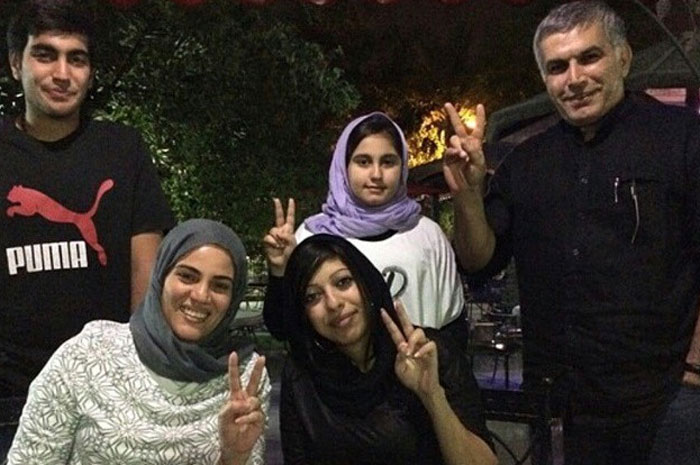
Back Row from left: Adam Rajab, Malak Rajab and Nabeel Rajab. Front Row from left: Sumaya Rajab and Zainab Alkhawaja. (Photo: Adam Rajab)
Human rights defenders often confront obstacles that make their work difficult. This is especially true in Bahrain, where the Sunni monarchy and government have been bent on silencing all opposition ever since the Arab Spring when tens of thousands of Bahraini citizens protested for democratic reform.
In recent months, the nation’s only independent news outlet, Al Wasat, was shuttered and prominent human rights activist Nabeel Rajab was sentenced to two years in prison for “spreading fake news”.
The families of activists suffer along with their loved ones and are often targeted with official harassment: detention, loss of employment, beatings and harassment. Each case is an individual story of a struggle for freedom.
A result of actions
Members of Sayed Ahmed Alwadaei’s family have been harassed and detained due to his ongoing campaigning for democracy and human rights in Bahrain. Most recently his mother-in-law and brother-in-law were detained while Alwadaei attended the United Nations Human Rights Council in March.
Alwadaei, director of advocacy at the Bahrain Institute for Rights and Democracy, is no stranger to detention: he was arrested twice in 2011 and served a six-month sentence in a Bahraini jail. He found asylum in the UK in July 2012. In February 2015, Alwadaei was among 72 Bahraini citizens to be stripped of their citizenship.
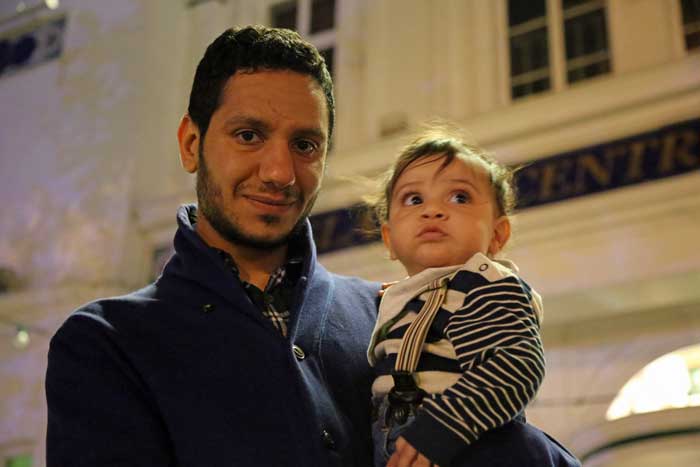
Sayed Ahmed Alwadaei with his son Yousif (Photo: Moosa Satrawi)
In October 2016, Alwadaei’s wife and infant son Yousif also faced official harassment as they tried to leave Bahrain to join Alwadaei in the UK. His wife was arrested at the airport and held overnight, during which time she was ill-treated. It was not until a few months later that she and her son were able to leave the country.
Other members Alwadaei’s family, including his sister, have also faced interrogations.
When asked how he continues campaigning under these circumstances, Alwadaei told index: “We can only get through this by sticking together and staying strong. It’s important to have a supportive family. The potential for arrest and torture is something they know and have to be willing to sacrifice.”
He added that he is balancing his efforts to get his mother-in-law out of prison while continuing his work in activism. “It’s hard but this is the right thing to do.”
“The oppression or torture aims to do one thing: to break your will because you’re not ready for the consequences,” Alwadaei said. “This is the state they want to leave you in. They want you to be broken and this is why we keep going.”
A life-long struggle
Maryam Al-Khawaja has been preparing for and participating in the struggle for human rights her entire life.
As a young child growing up in Denmark, she and her three sisters attended an English-speaking school, but the Al-Khawaja family knew they were only in the country temporarily. Her mother and father had been exiled for speaking out in Bahrain.
At a very young age, she remembers her parents asking her and her siblings before bed: “What have you done today to make the world a better place?” She told Index that her father wouldn’t help them answer the question because he wanted them to think about how the world could be. She remembers dinner conversations alive with politics and philosophical discussion about whether having false hope or no hope was better.
Around the 7th or 8th grade, Al-Khawaja knew wanted to be like her father when she grew up; she wanted to be an activist.
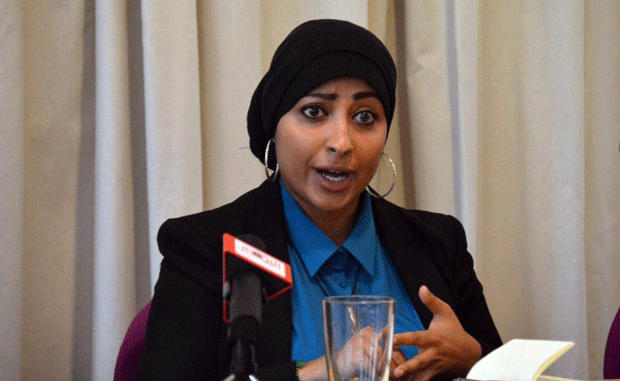
Maryam Al-Khawaja (Photo: David Coscia for Index on Censorship)
Al-Khawaja was 14 when her family returned to Bahrain in 2001. She recalls thinking her family was ready to take on the challenges and that the people of Bahrain would be ready to fight with them. But that was not the case. The country was tired of conflict and believed that the king’s promised reforms would be implemented. At the same time, activists were not popular among ordinary Bahrainis.
At college she said she was criticised by her classmates for speaking her mind about the state of their country, which caused her to lose interest in her father’s reform work. At the time, she asked him: “Why are you trying to change a situation for people who don’t want to change it for themselves?” His response was simple: “Someday you will understand.”
It wasn’t until 2011 during the Arab Spring protests that she developed a newfound respect for her father and was ashamed of herself for ever doubting him. She admits growing up in Denmark made her think fighting for human rights would be easy. When her father, along with 12 other leaders of the uprising, was arrested and sentenced to life imprisonment, she found that a life of campaigning isn’t so effortless.
During our conversation, Al-Khawaja jumped off the phone for a few minutes to take a call from her father. She had not heard from him in over three weeks and said their phone calls are always random and typically short as it is normal for the line to be cut if anything about the Bahrain government or any activist’s work is mentioned.
Until recently, her mother and sisters in Bahrain had not seen her father since February as their requests to visit have continually been denied. Al-Khawaja has not seen her father since 2014 as there are multiple fabricated charges against her that would mean imprisonment if she returned to the country.
Since her father’s imprisonment, Al-Khawaja and her older sister Zainab have been active in the push for human rights and freedom of speech in Bahrain. She says her father has two main characteristics as an activist: a fierce advocate and a fiery speaker. She explained that she and Zainab are the two parts to that whole: Al-Khawaja as the advocate and Zainab as the speaker.
Al-Khawaja said the work of her father and her sister Zainab has been tough for her two younger sisters. One sister had the highest scores in nursing school in Bahrain and graduation seemed to promise a job. But the paperwork from the government granting her access to work never came. She’s been waiting nearly eight years without a job. Al-Khawaja said it’s difficult for her family members when they’re in jail as they have to “take care of us when we cannot take care of ourselves”.
Her mother also felt the effects of the family member’s work when she was fired from her private school teaching job where she was the head of guidance.
A cause for celebrity status never wanted
Adam Rajab realised when he was young that his father Nabeel wasn’t like other dads. “I was so confused ‘why does my father work all day, while other fathers have certain working hours?,’” he told Index.
During a holiday he asked his father to take a break for a day. His father answered: “My colleagues are in prison. I can’t stop my work because they are suffering behind bars.”
In 2006, when Rajab was nine years old, he vividly recalls seeing his father come home bleeding from his head with a swollen and bruised back. “I was shocked and terrified but my father continued protesting like nothing had happened,” he said. “This was terrifying to me but the determination and fearlessness I saw in him really inspired me.”
In 2011 Nabeel Rajab’s work became well known. He appeared on TV and was the first activist to use social media to support the revolution then sweeping Bahrain. “Wherever we went, people would stop him and start taking pictures,” Adam said, adding that the strange situation was a shock to the family. “It started to become difficult because we couldn’t enjoy a private life like we used to.”
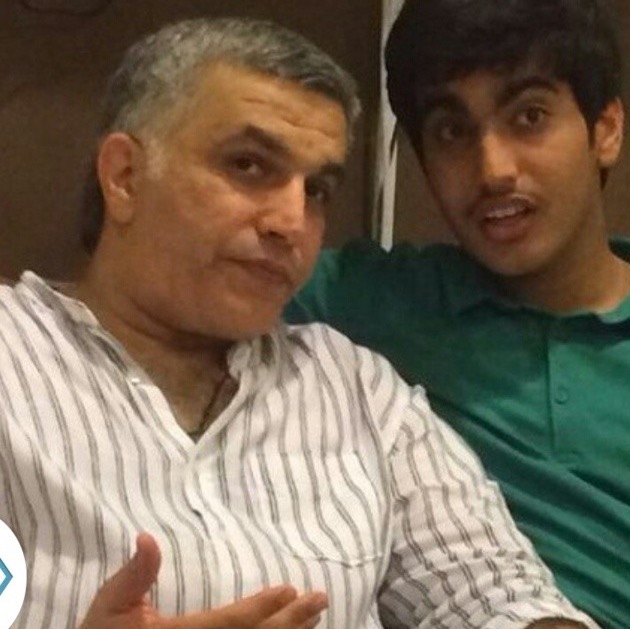
Nabeel Rajab with his son Adam Rajab
As a leader of the movement, Rajab’s father has become a face leaders around the world recognise but do little about. For years he has been in and out of jail. On 10 July 2017 he was sentenced to two years in prison for “broadcasting fake news”.
Although no one in the family has been arrested, his mother was harassed at her government job and then fired. Rajab and his sister have also faced harassment in school.
Rajab and his father have a very close relationship so the imprisonment has not been easy. “I haven’t seen him for more than a year now and he faces more charges which probably means more prison sentences,” Rajab said. “I find it difficult to enjoy anything while he is locked up in a cell and deprived of life, but as he taught me, the spirit is always up.”
Rajab wants his father to free and for them to live like any other ordinary family, but this does not take away from how proud he is or the strength of his belief in his father’s cause.
An open ended sentence
It’s difficult to imagine the emotions these activists and their families go through on a daily basis. A psychologist from the Refer Self Counselling Psychology Practice explained to Index that having a family member with a sentence with a sure release date is one case but when trials or release dates are postponed time and time again as they are in Bahrain, it is much more difficult. “We are rational problem solvers but not good with the unpredictable.”
The psychologist explained the situation in Bahrain is unlike what most with family members behind bars will ever experience. False hope puts an even greater emotional strain on loved ones.[/vc_column_text][/vc_column][/vc_row][vc_row][vc_column][vc_row_inner][vc_column_inner][vc_basic_grid post_type=”post” max_items=”4″ element_width=”6″ grid_id=”vc_gid:1503052292764-bb1a6c59-5e91-2″][/vc_column_inner][/vc_row_inner][/vc_column][/vc_row]
21 Jul 2017 | Bahrain, Middle East and North Africa, News and features
[vc_row][vc_column][vc_column_text]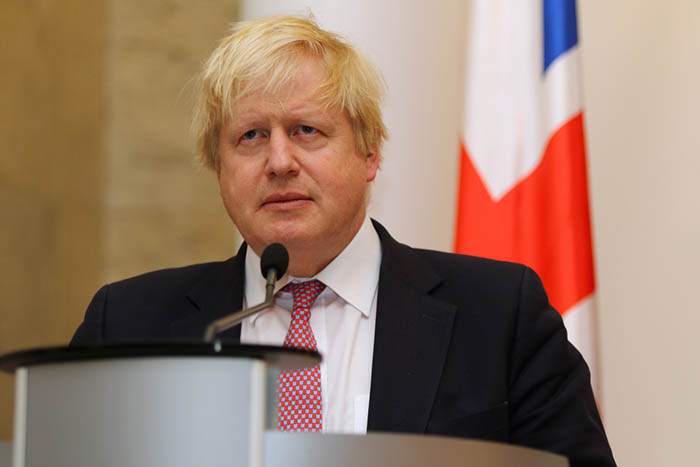
Index on Censorship welcomes UK foreign secretary Boris Johnson’s interest in human rights. The UK Foreign and Commonwealth Office’s 2016 Annual Human Rights Report, released on Thursday 20 July, highlights the UK’s work to promote human rights around the world and sets out a list of 30 “Human Rights Priority Countries”, including Bahrain, Iran, Russia and Saudi Arabia.
In the report preface, Johnson writes: “Human rights are not inimical to development and prosperity; the opposite is true. Freedom of speech, freedom of association, freedom to practice whatever religion you want and live your life as you please, provided you do no harm, are the essential features of a dynamic and open society.”
Index agrees wholeheartedly and acknowledges that the report features many valiant efforts, including, for the first time, a section dedicated to modern slavery – a top priority for the UK government.
But the report – issued on “take out the trash” day, the last of the parliamentary sessions before a seven-week recess – does not, as it claims, seem to aspire to the “passionate advocacy” of Charles James Fox, the British Whig statesman and anti-slavery campaigner.
Instead, Johnson offers a watered-down endorsement of human rights and his department’s understanding of advocacy is seriously flawed. To borrow the foreign secretary’s own words, this is “unthinkable for anyone inspired by the example of Charles James Fox”.
Take Bahrain, for example. While the report does go some way to criticising a handful of the country’s human rights violations, this is not done not in nearly strong enough terms, and you’d be forgiven for thinking these violations are blips in an otherwise rosy picture. This is, after all, a country which has only “restricted some civil liberties”.
“There was a mixed picture on human rights in Bahrain in 2016,” the discussion of the Persian Gulf kingdom begins. “Compared with the region, Bahrain remains progressive in women’s rights, political representation, labour rights, religious tolerance and institutional accountability.”
Firstly, this is a faulty comparison. Looking at the region as a whole serves only to make Bahrain look better than it actually is. Bahrain may have 15% representation of women in parliament, as the report highlights, but this cannot be described as progressive. As of 2014, the government of Saudi Arabia, not known for its feminism, was made up of 19.9% women.
In April 2016, a royal decree that increased the rights of women in Bahrain only passed through parliament scrutiny on a technicality. In March of that year, Bahrain detained human rights activist and blogger Zainab al-Khawaja along with her one-year-old son. She was released in May but fled the country out of fear of re-arrest.
While the report does go on to criticise the dissolving of the country’s main Shia opposition party, Al Wefaq, it remains a mystery why the report would first highlight political representation and religious tolerance as positives in Bahrain.
The country certainly does not have enough institutional accountability, and this is not something it should be commended on.
Even the brief mention of Bahraini human rights activist Nabeel Rajab, sentenced to two-years in prison just for speaking to journalists 10 days before the government’s report was released, only refers to Index award-winner as having been arrested. The sheer scale of Rajab’s case is not accounted for.
On 3 February a coalition of 21 groups and individuals, including Index on Censorship, urged Johnson to call for Rajab’s release. In the time since, the US state department has called for Rajab’s release and condemned his sentencing. The UK government so far has only “voiced its concern” in the weakest possible terms, and as yet has not acknowledged Rajab’s sentencing.
When Theresa May became prime minister of the UK, Bahrain was one of the first countries she visited. As new documents reveal, UK contractors visited the country 28 times in 12 months amid Bahrain’s ongoing human rights crackdown. In all, “UK government contractors have spent more than 650 days in Bahrain training prison guards, including officers at the notorious Jau prison where death-row inmates are held and allegedly tortured,” the Middle East Eye reported earlier this month.
The UK government appears to be in no position to heap praise on Bahrain for strengthening the rule of law, justice reform, its independent human rights institutions, prisoners’ rights and improvements at Jau.
Many more issues in the Annual Human Rights Report must be scrutinised when MPs return in September. If the Bahrain section is anything to go by, the report should be found to fall far short of being “passionate” about human rights.
[/vc_column_text][/vc_column][/vc_row][vc_row][vc_column][vc_basic_grid post_type=”post” max_items=”4″ element_width=”6″ grid_id=”vc_gid:1500646119465-139983e0-dcda-4″ taxonomies=”716″][/vc_column][/vc_row]






